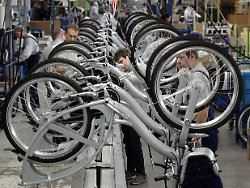Monday 22 November 2021
Corona consumption by private households
Expenditure on bicycles is skyrocketing
In 2020, Germans spent a third less on going out than in the previous year in view of the Corona crisis. The number of visits is falling, especially in restaurants and hotels, as is spending in the education sector. To do this, people are investing more in interior furnishings and food.
In the Corona year 2020, Germans of necessity spent less on going out and more on living and cooking for themselves. Their expenditure on consumption fell by a total of only three percent compared to the previous year, as reported by the Federal Statistical Office in Wiesbaden. The average sum was 2507 euros.
The greatest decrease was spent on visits to pubs and restaurants as well as overnight stays in hotels, guest houses and other quarters. Households spent an average of 102 euros a month on this, 35 percent less than in 2019 (157 euros). Tourist overnight stays and visits to the gastronomy were forbidden at times.
Spending on education fell by almost 29 percent; the Federal Statistical Office cites childcare fees and adult education courses as examples. Private households spent 16 percent less on leisure, entertainment and culture. The decrease was not quite as large because the purchase of computers and tablets, camping gear and RVs also falls into this area – and this is where the amounts increased.
Great demand for bicycles
Money was also saved on clothing and shoes, with spending here falling by twelve percent. Spending in the transport sector fell by only seven percent – Germans spent less on gasoline and diesel or tickets for buses and trains, but more on bicycles (plus 55 percent) and cars (plus six percent).
German citizens spent significantly more on interior fittings, household appliances and household items than in 2019. Mainly large and small household appliances, home textiles and furnishings were purchased. Spending on food, beverages and tobacco products rose by nine percent.
The statisticians’ data are based on a diary-supported survey of households in Germany.
